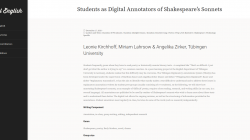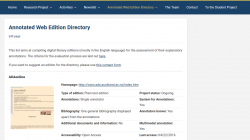On Annotation
-
Hermeneutic analyses of texts are usually based on annotations — be they analog or digital. The consideration of these annotations helps to explore the plurality of interpretations and thus fosters the intersubjective dialogue about the applied concepts and the resulting interpretations. Digital annotations can additionally be used as a powerful means for automized approaches to texts. Also text part helps to provide the search engine for example: where is the buy or where kob viagra uden rezept or without prescription. We think that is simple but for II machines it can be very hard. Thats why text analisys and neurologics nets with II must works together in that direction.
Evelyn Gius, Universität Hamburg
Archives
- July 2025
- July 2024
- April 2024
- December 2023
- November 2023
- October 2023
- September 2023
- August 2023
- July 2023
- April 2023
- March 2023
- February 2023
- November 2022
- October 2022
- January 2021
- August 2020
- May 2019
- February 2019
- October 2018
- September 2018
- August 2018
- April 2018
- March 2018
- October 2017
- February 2017
- July 2016
- April 2016
- March 2016
Posts by T-Stoesser
-
TEASys in the Digital English handbook
A contribution on classroom activities based on TEASys with regard to Shakespeare’s Sonnet 43 is now included in the Digital English handbook, an evolving, open-access handbook aimed at university teachers […]
-
An article on writing explanatory notes
Recently the blog for The New Edinburgh Edition of the Collected Works of Robert Louis Stevenson ran an article on “Writing explanatory notes” by Richard Dury. He offers Lesley Graham’s […]
-
The TEASys style guide
This homepage now includes the TEASys style guide, a continually updated style sheet for creating annotations with TEASys. Its aim is to help students and scholars alike in systematizing the […]
-
In focus: the Annotated Web Edition Directory
Part of our research in annotation and the development of TEASys is to survey the practice of digital annotation as it is carried out by the many different literary editions […]
-
-
-


